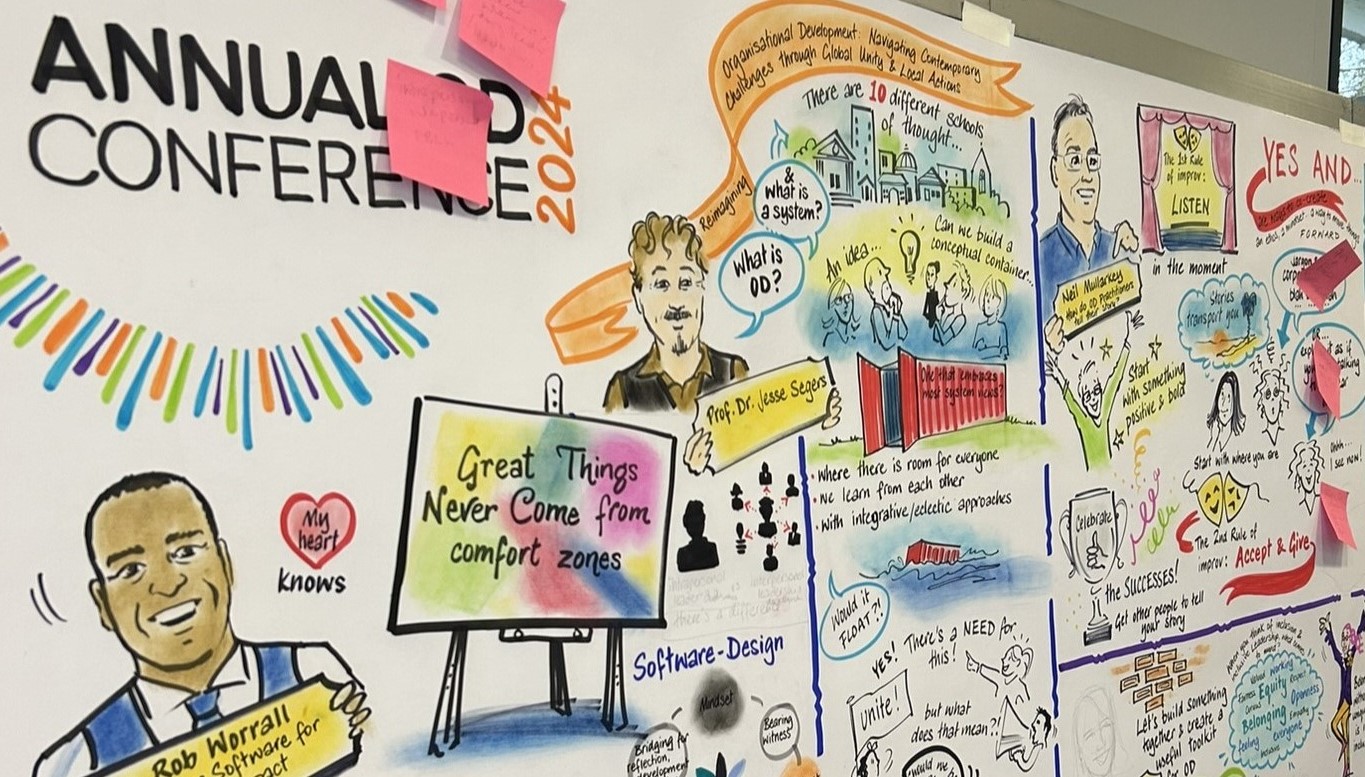And would you like to become one, or hire one for your organisation?

Let’s start with the basics: do you know what an Organisation Development practitioner is?
Back in 2015, Roffey Park’s Management Agenda survey investigated the main barriers to effective organisational development, and found the most common response was “managers don’t know what it is”.
Four years on and the number of OD roles advertised – often at very attractive salaries – suggests a wider understanding. But what exactly does the job entail? Is there an OD practitioner definition? What qualifications do OD practitioners need? What are the competencies of OD practitioners? What’s the definition of an OD Practitioner? And could a practitioner, either in-house or a consultant, support your company to work more efficiently to make the changes it needs?
What is Organisational Development (OD)?
In the simplest terms, Organisational Development is something which enables people to change systems and culture in businesses. An organization development practitioner applies behavioural science to issues within organisations and systems to align capability and strategy, intervening in systems so that people can better work together to achieve their goals.
As the Roffey Park Diploma in Organisational Development Practice course introduction puts it: “In today’s fast-paced, ever-changing business environment, an organisation’s ability to respond is key to survival and success. It is not the ‘organisation’ however that decides when, why or how to respond, it’s the people within it.”
Organisations can be striving for change but traditional top-down approaches rarely trigger sustainable change in working methods, culture and personal effectiveness. OD addresses this issue, backed by behavioural science, and human values.
More specifically, OD creates a continuous cycle of improvement, from strategy through implementation, evaluation and further change, increases communication at all levels of an organisation, increases innovation and increases profit. Read more about Organisational Development and its history.
Why should I consider hiring an Organisational Development practitioner?

Many organisations are finding their business models challenged by industry disruptors and need an individual – or more likely a team – to pull together new ways of working and thinking to remain competitive or implement a new strategy.
Where would an organisational development practitioner fit into my company?
It depends at which level you’re hiring, and what your ambitions are for change and culture management within your organisation. Many organisations have Organisational Development practitioners at senior and strategic levels, relying on their input to help deliver the strategy. Others might hire an OD consultant to help to implement a particular project or to meet a particular objective. OD managers may be part of HR teams but can perhaps be most effective when located with change, transformation and strategy teams, or separately but reporting directly to senior leaders that have influence across the organisation.
What is the Organisation Development Practitioner Role? Are there different roles for Organisational Development practitioners?
A look at recent job advertisements and in particular OD practitioner job descriptions is a useful guide to what is expected at different levels in the role of an OD practitioner, and OD practitioner skills.
A head of Organisational Development, for instance, might be asked to define and implement corporate organisational development and learning strategies aligned with the strategic plan. The leader would also provide specialist expertise to the Director of HR, Chief People Officer, COO and others in rolesdeveloping organisational culture and performance management in conjunction with staff, and lead a specialist team to deliver aligned programmes.
An OD manager might be asked to lead on a culture of continuous improvement in relevant teams to deliver on the company’s strategy, to lead on the design and delivery of its values and operation plans, and to collaborate with senior staff to enhance performance and employee satisfaction by improving the processes of how work is done.

In this sense the roles may seem quite similar to other positions connected to an organisation’s strategic development. The main difference with OD of course, is how this is done. OD practitioners start with the people, rather than an organisational structure blueprint. An essential part of their approach relates to the nature of conversations they have, with whom and to what end, working with relational and softer forms of power to understand what really makes the organisation tick and what is therefore needed to support real organisational improvement. This arguably ensures that the organisation brings people with it on the transformation journey: change happens with people, not just to people.
How much are OD practitioners paid?
The salary range for Organisational Development practitioners varies according to whether the role is as an external OD consultant or an in-house OD manager.
OD consultant (also known as external OD practitioners) – salaries appear to range between about £43k and £48k per year, depending on country/UK region.
In-house OD managers enjoy a much wider range of pay, depending on organisation size, region and seniority. Recent job vacancies have had salaries ranging from around £30k up to around £50k, higher in the UK civil service, and £100k plus in a global financial organisation.
Advisors and less senior staff could expect to earn from around £22k.
What are OD practitioner qualifications? What are OD practitioner competencies?
One of the most comprehensive offerings on the market was developed and is delivered by Roffey Park Institute. The transformational Diploma in Organisational Development Practice is offered both online and as a residential programme.
The modular programme focusses on how OD impacts at an individual, group and organisation or network level plus, for those taking the course in the UK, there’s an option of also attending a Graduate Certificate in Organisational Development, validated by the University of Sussex. These cover the competencies of an effective OD practitioner through a combination of experiential and peer learning, specialist workshops and high quality resources, all supported by core and cutting edge theory, and highly enabling facilitators.
Who needs to take an OD Practitioners programme?

This sort of in-depth programme is ideal if you’re working in an Organisational Development capacity, but you (or your colleagues) don’t yet see you as a full practitioner. Or perhaps you’re a change agent, manager or leader who understands the importance of bringing people with you – but needs more insight in how to achieve this. Learning about different ways to interact, work with personal power and understand systemic and cultural issues can be very useful in management. Or perhaps you’re in HR or Learning Development and want to improve your knowledge of organisational development.
Others who really benefit from the Diploma in Organisational Development Practice course are staff involved in local authority or public sector transformations, employees of businesses who have been recognised as having organisational development ability, or those in non-profit environments who are seeking to develop or make changes.
James Thompson, senior HR business partner at Jaguar Land Rover, said of the Roffey Park organisational development course that it was: “absolutely brilliant. A beautifully pitched journey through OD, self, group and organisations. Insightful, impactful, humbling, energising, uplifting and transformational. The best development programme I have been on.”
For senior OD practitioners and external consultants, you’ll find masters-level OD qualifications such as the MSc in People and Organisational Development. It’s ideal for HR professionals keen to deepen their practical skillset, for Learning and Development and Talent managers who want to interpret the requirements of culture change and organisational transformation, and for Transformation Officers/Change Leads who want to work for the maximum guarantee of project success.
This kind of programme is equally beneficial to CEOs or other c-suite executives and senior directors who need to see the full picture of the organisational change process, specifically the how change is going to happen rather than stopping at what change is required. Equally, a masters in OD is highly sought after in consultants working in change and organisation development.
Other postgraduate programmes are available, including sometimes in-house at major organisations.
Roffey Park is a founder organisation of the principles of OD – it was founded in 1947, at a time when what happens in individuals and groups at work was a subject of increasing interest in Europe and the UK, and not long after Kurt Lewin began his pioneering work at MIT.
Over the decades, Roffey Park has become an international centre of excellence in OD, with a history of defining and developing innovative organisational development practice.
Share your own challenges and organisational objectives and we can also develop a programme to meet your organisation’s unique needs. Find out more or email for more details about courses in the UK or Singapore





